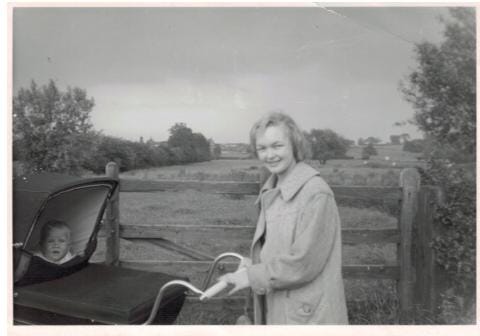Mother's Day Poems
The greatest poets are sadly lacking in notable poems for their mothers. I had done my best to make up for the incomprehensible deficiency...

Mother’s Smile
by Michael R. Burch
for my mother, Christine Ena Burch
There never was a fonder smile
than mother’s smile, no softer touch
than mother’s touch. So sleep awhile
and know she loves you more than “much.”
So more than “much,” much more than “all.”
Though tender words, these do not speak
of love at all, nor how we fall
and mother’s there, nor how we reach
from nightmares in the ticking night
and she is there to hold us tight.
There never was a stronger back
than father’s back, that held our weight
and lifted us, when we were small,
and bore us till we reached the gate,
then held our hands that first bright mile
till we could run, and did, and flew.
But, oh, a mother’s tender smile
will leap and follow after you!
I have dedicated this poem to my mother, but you are welcome to dedicate it to yours, or to any good mother you know.
don’t forget ...
by Michael R. Burch
for Beth and all good mothers
don’t forget to remember
that Space is curved
(like your Heart)
and that even Light is bent
by your Gravity.
I have dedicated this poem to the love of my life, but you are welcome to dedicate it to the love of yours, if you like it. The opening lines were inspired by a love poem by e. e. cummings.
Dawn
by Michael R. Burch
for Beth, Laura, and all good mothers
Bring your peculiar strength
to the strange nightmarish fray:
wrap up your cherished ones
in the golden light of day.
Amir Khusrow’s elegy for his mother
translation by Michael R. Burch
Wherever you shook the dust from your feet
is my relic of paradise!
Untitled Translations
A man may attempt to burnish pure gold,
but who can think to improve on his mother?
—Mahatma Gandhi, translation/interpretation by Michael R. Burch
God's ultimate masterpiece is a mother's heart.
—St. Therese of Lisieux, loose translation/interpretation by Michael R. Burch
Mother: the tenderest word on the world's lips.
—Khalil Gibran, loose translation/interpretation by Michael R. Burch
Children anchor their mothers to life.
— Sophocles, translation/interpretation by Michael R. Burch
Mother's Day Haiku
by Michael R. Burch
Crushed grapes
surrender such sweetness:
a mother’s compassion.
My footprints
so faint in the snow?
Ah yes, you lifted me.
An emu feather ...
still falling?
So quickly you rushed to my rescue.
The eagle sees farther
from its greater height:
our mothers' wisdom.
The Poet's Condition
by Michael R. Burch
for my mother, Christine Ena Burch
The poet's condition
(bother tradition)
is whining contrition.
Supposedly sage,
his editor knows
his brain's in his toes
though he would suppose
to soon be the rage.
His readers are sure
his work's premature
or merely manure,
insipidly trite.
His mother alone
will answer the phone
(perhaps with a moan)
to hear him recite.
But let’s not be over-hasty and forget our grandmothers…
She Always Grew Roses
by Michael R. Burch
for my grandmother, Lillian Lee
Tell us, heart, what the season discloses.
“Too little loved by the ego in its poses,
she always grew roses.”
What the heart would embrace, the ego opposes,
fritters away, and sometimes bulldozes.
Tell us, heart, what the season discloses.
“Too little loved by the ego in its poses,
she loved nonetheless, as her legacy discloses—
she always grew roses.”
How does one repent when regret discomposes?
When the shadow of guilt, at last, interposes?
Tell us, heart, what the season discloses.
“Too little loved by the ego in its poses,
she continued to love, as her handiwork shows us,
and she always grew roses.”
Too little, too late, the grieved heart imposes
its too-patient will as the opened book recloses.
Tell us, heart, what the season discloses.
“She always grew roses.”
The opened-then-closed book is a picture album. The season is late fall because it was in my autumn years that I realized I had written poems for everyone in my family except Grandma Lee. Hopefully it is never too late to repent and correct an old wrong.
Little Sparrow
by Michael R. Burch
for my petite grandmother, Christine Ena Hurt, who couldn’t carry a note, but sang her heart out with great joy, accompanied, I have no doubt, by angels
“In praise of Love and Life we bring
this sacramental offering.”
Little sparrow of a woman, sing!
What did she have? Hardly a thing.
A roof, plain food, and a tiny gold ring.
Yet, “In praise of Love and Life we bring
this sacramental offering.”
“Hosanna!” angelic choirs ring.
Little sparrow of a woman, sing!
Whence comes this praise, as angels sing
to her tuneless voice? What of Death’s sting?
Yet, “In praise of Love and Life we bring
this sacramental offering.”
Let others have their stoles and bling.
Little sparrow of a woman, sing!
“In praise of Love and Life we bring
this sacramental offering
as the harps of beaming angels ring.
Little sparrow of a woman, sing!”
Our English Rose
by Michael R. Burch
for my mother, Christine Ena Burch
The rose is—
the ornament of the earth,
the glory of nature,
the archetype of the flowers,
the blush of the meadows,
a lightning flash of beauty.
"Our English Rose" is my translation of a Sappho epigram.
Delicacy
by Michael R. Burch
for my mother, Christine Ena Burch
Your love is as delicate
as a butterfly cleaning its wings,
as soft as the predicate
the hummingbird sings
to itself, gently murmuring—
“Fly! Fly! Fly!”
Your love is the string
soaring kites untie.
Such Tenderness
by Michael R. Burch
for the mothers of Gaza and Ukraine
There was, in your touch, such tenderness—as
only the dove on her mildest day has,
when she shelters downed fledglings beneath a warm wing
and coos to them softly, unable to sing.
What songs long forgotten occur to you now—
a babe at each breast? What terrible vow
ripped from your throat like the thunder that day
can never hold severing lightnings at bay?
Time taught you tenderness—time, oh, and love.
But love in the end is seldom enough ...
and time?—insufficient to life’s brief task.
I can only admire, unable to ask—
what is the source, whence comes the desire
of a woman to love as no God may require?
Childless
by Michael R. Burch
How can she bear her grief?
Mightier than Atlas, she shoulders the weight
Of one fallen star.
The Greatest of These ...
by Michael R. Burch
for my mother, Christine Ena Burch
The hands that held me tremble.
The arms that lifted
fall.
Angelic flesh, now parchment,
is held together with gauze.
But her undimmed eyes still embrace me;
there infinity can be found.
I can almost believe such unfathomable love
will still reach me, underground.
Elegy for a little girl, lost
by Michael R. Burch
. . . qui laetificat juventutem meam . . .
She was the joy of my youth,
and now she is gone.
. . . requiescat in pace . . .
May she rest in peace.
. . . amen . . .
Amen.
I was touched by this Latin prayer, which I discovered in a novel I read as a teenager, around age 16 or 17, and chose to incorporate into a poem. From what I now understand, “ad deum qui laetificat juventutem meam” means “to the God who gives joy to my youth,” but I am sticking with my original interpretation: a lament for a little girl at her funeral. The phrase can be traced back to Saint Jerome's translation of Psalm 42 in the Vulgate Latin Bible (circa 385 AD).
Final Lullaby
by Michael R. Burch
for my mother, Christine Ena Burch
Sleep peacefully—for now your suffering’s over.
Sleep peacefully—immune to all distress,
like pebbles unaware of raging waves.
Sleep peacefully—like fields of fragrant clover
unmoved by any motion of the wind.
Sleep peacefully—like clouds untouched by earthquakes.
Sleep peacefully—like stars that never blink
and have no thoughts at all, nor need to think.
Sleep peacefully—in your eternal vault,
immaculate, past perfect, without fault.
Amen
Remembering Not to Call
by Michael R. Burch
a villanelle permitting mourning, for my mother, Christine Ena Burch
The hardest thing of all,
after telling her everything,
is remembering not to call.
Now the phone hanging on the wall
will never announce her ring:
the hardest thing of all
for children, however tall.
And the hardest thing this spring
will be remembering not to call
the one who was everything.
That the songbirds will nevermore sing
is the hardest thing of all
for those who once listened, in thrall,
and welcomed the message they bring,
since they won’t remember to call.
And the hardest thing this fall
will be a number with no one to ring.
No, the hardest thing of all
is remembering not to call.
Arisen
by Michael R. Burch
for my mother, Christine Ena Burch
Mother, I love you!
Mother, delightful,
articulate, insightful!
Angels in training,
watching, would hover,
learning to love
from the Master: a Mother.
You learned all there was
for this planet to teach,
then extended your wings
to Love’s ultimate reach ...
And now you have soared
beyond eagles and condors
into distant elevations
only Phoenixes can conquer.
Amen
Oh, let me sing you a lullaby
by Michael R. Burch
for Jeremy (written from his mother’s perspective)
Oh, let me sing you a lullaby
of a love that shall come to you by and by.
Oh, let me sing you a lullaby
of a love that shall come to you by and by.
Oh, my dear son, how you’re growing up!
You’re taller than me, now I’m looking up!
You’re a long tall drink and I’m half a cup!
And so let me sing you this lullaby.
Oh, my sweet son, as I watch you grow,
there are so many things that I want you to know.
Most importantly this: that I love you so.
And so let me sing you this lullaby.
Soon a tender bud will thrust forth and grow
after the winter’s long virgin snow;
and because there are things that you have to know ...
Oh, let me sing you this lullaby.
Soon, in a green garden a new rose will bloom
and fill all the world with its wild perfume.
And though it’s hard for me, I must give it room.
And so let me sing you this lullaby.
Success
by Michael R. Burch
for Jeremy
We need our children to keep us humble
between toast and marmalade;
there is no time for a ticker-tape parade
before bed, no award, no bright statuette
to be delivered for mending skinned knees,
no wild bursts of approval for shoveling snow.
A kiss is the only approval they show;
to leave us—the first great success they achieve.





